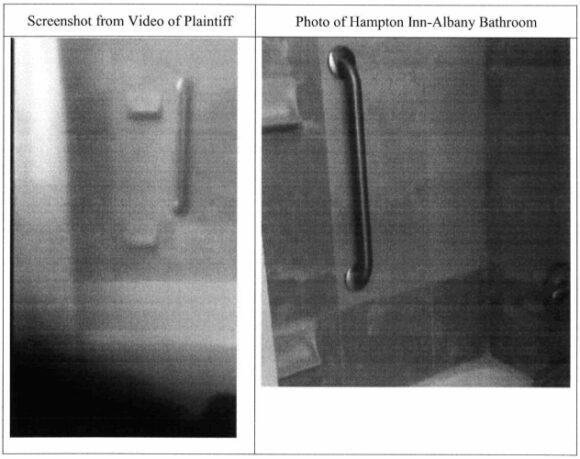Four insurance companies, unable to escape a duty to defend a New York hotel where a young woman was secretly videotaped in the shower in 2015, have reached a settlement in the case that made headlines around the world.
Citizens Insurance Co. of America, Massachusetts Bay Insurance Co., Westfield Insurance and Starr Indemnity & Liability this week notified a federal court in Georgia that they had settled with the owners and management of a Hampton Inn in Albany, New York.
The terms of the settlement were not disclosed in court filings, and attorneys in the case could not be reached for comment Thursday. Banyan Tree Management managed the hotel and Albany Downtown Hotel Partners owned it under license from Hilton Worldwide.
The woman, known only as Jane Doe, filed suit in 2019 for $100 million after an employee of the hotel filmed her with a hidden camera then attempted to extort thousands of dollars from her. The video was uploaded to a number of porn web sites.
The Chicago woman, who was in Albany in 2015 to sit for the New York Bar exam, never paid the voyeur and fought for months to have the videos removed from porn sites, according to court documents and news reports. She filed one negligence and premises liability suit in Georgia because Banyan, a Florida-registered company, and Albany Downtown have offices and executives in Atlanta. A separate lawsuit was filed in Virginia, home of Hilton’s offices.
The victim said in her lawsuits that the exposure and blackmail was so traumatizing that she had suffered gastrointestinal problems and had lost 30 pounds after the perpetrator emailed her and her associates.

“It was just absolutely traumatizing because these are people I went to law school with,” the woman told Good Morning America in 2018. “They’re friends, they’re co-workers. And they were sent a link to what looks like an email I sent.”
News sites across the country and from Toronto to London reported on the salacious story.
The outcome of the victim’s Virginia suit was unavailable Thursday, although court records show the case has been closed. The woman’s Georgia lawsuit settled in April of this year for an undisclosed amount, just ahead of a jury trial. Her attorneys filed a motion in June, however, noting that the hotel companies had not paid anything.
In the separate insurance suit, the Hampton Inn’s insurance carriers asked a federal judge in Georgia to declare that they had no duty to defend or indemnify the hotel against the lawsuit damages. The insurers argued that the hotel’s commercial liability and excess policies excluded coverage for actions that violated federal law, the video taping and camera were not part of the hotel’s business, and the video was not an actual invasion of the woman’s privacy.
Also, some of the policies were in place when the videotaping happened in 2015, but not in 2018 at the time of the extortion, when the video came to light, the insurers argued.
U.S. District Judge Mark Cohen agreed that Coverage A for some of the policies did not apply, because Coverage A required bodily injury. But the judge found that Coverage B in the policies did apply. The policies provided up to $2 million in aggregate coverage.
Citizens and Westfield, owned by The Hanover Group, attempted in their motion to add to the wording of the policies, Cohen noted.
“Hanover’s attempt to add an additional phrase to the otherwise unambiguous policy language would amend the Hanover Policies to require that the ‘personal and advertising injury’ offense include only those acts that are expressly authorized by Banyan and Albany’s express business policies or practices. This is not what the plain language of the Hanover Policies state, nor is it reasonable to interpret them as such,” the judge wrote in his 2022 decision.
“Taken to its logical conclusion, Hanover’s expanded interpretation of ‘arising out of’ would render the Hanover Policies illusory and it would effectively mean that the policies would rarely, if ever, cover ordinary negligence claims as those are frequently proven by a showing of a deviation from business practices and policies,” he added.
The insurance companies appealed Cohen’s ruling to the U.S. 11th Circuit Court of Appeals. A panel of judges there upheld the decision and further excoriated the carriers’ arguments.
“The appellants failed to even make a showing of ambiguity, let alone definitively establish that the Underlying Complaint falls outside their policies or that an exclusion precludes coverage,” the appellate judges wrote in 2023.
The panel found “unpersuasive” the insurers’ arguments that the woman’s right to privacy had not been violated and that the filming did not arise out of the hotel’s business.
“While filming a showering guest is clearly not a ‘legitimate’ hotel practice, when a hotel employee—who would not have had access to the room but for his authority—places the camera in the bathroom and circulates the video, the injury undoubtably imputes to the hotel,” the 11th Circuit opinion reads.
Topics Carriers
Was this article valuable?
Here are more articles you may enjoy.



 Pipeline Explodes at Delfin LNG Planned Project in Louisiana
Pipeline Explodes at Delfin LNG Planned Project in Louisiana  ‘Structural Shift’ Occurring in California Surplus Lines
‘Structural Shift’ Occurring in California Surplus Lines  Allstate CEO Wilson Takes on Affordability Issue During Earnings Call
Allstate CEO Wilson Takes on Affordability Issue During Earnings Call  Nine-Month 2025 Results Show P/C Underwriting Gain Skyrocketed
Nine-Month 2025 Results Show P/C Underwriting Gain Skyrocketed 


